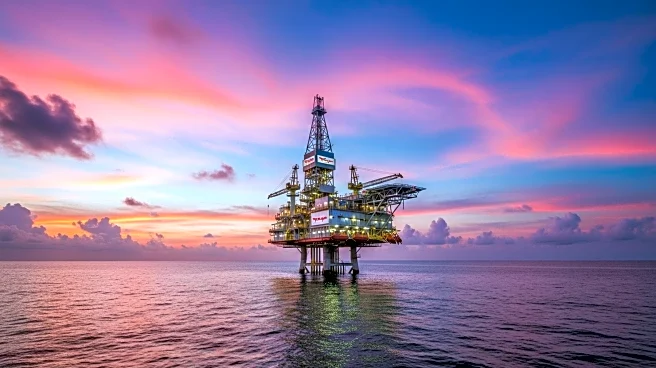What's Happening?
TotalEnergies has been awarded the Nzombo exploration permit in the Republic of the Congo, marking a significant step in its strategy to enhance offshore oil production. The permit covers a 1,000-square-kilometer area located 100 kilometers off the coast of Pointe-Noire, adjacent to the company's existing Moho production facilities. These facilities currently produce 140,000 barrels of oil per day, which is over half of the country's total output. The Nzombo Permit is part of TotalEnergies' broader plan to expand its exploration portfolio while optimizing costs through shared infrastructure. The company plans to drill an exploration well by the end of 2025, leveraging the proximity to Moho facilities to reduce capital and operational costs.
Why It's Important?
This development is crucial as it underscores TotalEnergies' commitment to increasing oil production in the Republic of the Congo, aligning with the country's goal of reaching 500,000 barrels per day by 2030. The company's $500 million investment in new wells across the region highlights its focus on low-cost, low-emission assets, which is in line with global decarbonization trends. This move not only strengthens TotalEnergies' position in the global hydrocarbon market but also supports the local economy by potentially increasing employment and infrastructure development. However, it also raises environmental concerns, particularly regarding the sustainability of fossil fuel expansion.
What's Next?
TotalEnergies is expected to continue its drilling activities, with the first well in the Nzombo Permit area anticipated by late 2025. The company will likely monitor production data from the Moho Nord field and the success of the Marine XX permit appraisal to assess further opportunities in the region. Stakeholders, including environmental groups and local communities, may respond to these developments, potentially influencing regulatory policies and public opinion on fossil fuel projects.
Beyond the Headlines
The expansion of TotalEnergies in the Republic of the Congo highlights the ongoing tension between economic development and environmental sustainability. The company's zero routine flaring policy and reinjection of produced water are steps towards mitigating environmental impact, yet the broader implications of increased fossil fuel production remain a concern. This situation reflects a global challenge where energy companies must balance growth with environmental responsibility.









